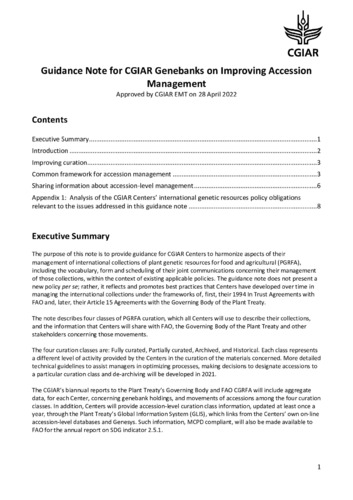Guidance note for CGIAR Genebanks on improving accession management
The purpose of this note is to provide guidance for CGIAR Centers to harmonize aspects of their management of international collections of plant genetic resources for food and agricultural (PGRFA), including the vocabulary, form and scheduling of their joint communications concerning their management of those collections, within the context of existing applicable policies. The guidance note does not present a new policy per se; rather, it reflects and promotes best practices that Centers have developed over time in managing the international collections under the frameworks of, first, their 1994 In Trust Agreements with FAO and, later, their Article 15 Agreements with the Governing Body of the Plant Treaty.
The note describes four classes of PGRFA curation, which all Centers will use to describe their collections, and the information that Centers will share with FAO, the Governing Body of the Plant Treaty and other stakeholders concerning those movements.
The four curation classes are: Fully curated, Partially curated, Archived, and Historical. Each class represents a different level of activity provided by the Centers in the curation of the materials concerned. More detailed technical guidelines to assist managers in optimizing processes, making decisions to designate accessions to a particular curation class and de-archiving will be developed in 2021.
The CGIAR’s biannual reports to the Plant Treaty’s Governing Body and FAO CGRFA will include aggregate data, for each Center, concerning genebank holdings, and movements of accessions among the four curation classes. In addition, Centers will provide accession-level curation class information, updated at least once a year, through the Plant Treaty’s Global Information System (GLIS), which links from the Centers’ own on-line accession-level databases and Genesys. Such information, MCPD compliant, will also be made available to FAO for the annual report on SDG indicator 2.5.1.
Information about newly ‘archived’ materials serves to notify FAO (as well as all Contracting Parties to the Plant Treaty, members of the FAO CGRFA and stakeholder observers) about Centers’ longer-term proposals to remove materials from the international collections. In the vast majority of cases, it will take several years for materials that Centers ‘archive’ to deteriorate to the point that they are no longer viable, and thereby move in status to ‘Historical’. Thus, FAO, and the Governing Body of the Treaty and CGRFA will have the opportunity to react as they deem appropriate with regard to these proposals. Furthermore, Centers will adopt the practice of proactively notifying the countries from which materials proposed for archiving were originally collected, to provide them the opportunity to access samples before they lose viability.

